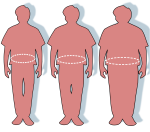 By Jim Cline and Erica Shelley Nelson
By Jim Cline and Erica Shelley Nelson
Representing the Injured or Disabled Member
Part 13: The Duty to Accommodate a Weight
This article is the 13th in a multiple part series covering the rights your injured and disabled members have and how you, as a union or guild representative, can best assist them. Over the next two to three months, we’ll be publishing, in various segments, information on how state and federal laws protect your members who are hurt or otherwise unable to work. We’ll cover topics including disability discrimination law, the FMLA, job protection rights under the CBA, workers compensation, disability benefits, and the right to bring a civil lawsuit.
The topics we are covering all also going to be addressed in detail in an upcoming book we’re publishing: Helping the Injured or Disabled Member: A Guidebook for the Washington Law Enforcement and Fire Union Representative. It is also our intention over the course of the next year to travel through the state and provide training to public safety union and guild representatives on how best to enforce these rights. Expect to hear more on that in the months ahead.
The 13th article in these newsletter series provides an overview and introduction to the rights of accommodation under disability laws. For more information, visit our Premium Website. On the website you’ll find an on line version of the Injured or Disabled Member’s Guidebook and other information on the laws covering your members.
It is unclear the extent to which state and federal disability laws will protect individuals with weight problems. The federal laws do not treat normal overweight as a protected disability.[1] Morbid obesity might qualify as a disability, but federal courts have often looked to whether there is an underlying physiological disability that caused the obesity.[2] Regardless, individuals who are morbidly obese are very unlikely to be able to fulfill the essential functions of most law enforcement and firefighter positions.
The extent to which Washington state disability law may protect overweight individuals is still undefined. Since state law defines disabilities in terms of “abnormalities,” it is an open question as to how heavy an individual might be before they are entitled to legal protection.
In the next article in this series, we’ll discuss the rights of employees to be accommodated when they are battling alcoholism.
[1] EEOC v. Watkins Motor Lines, Inc., 463 F.3d 426 (6th Cir. 2006).
[2] Id.


